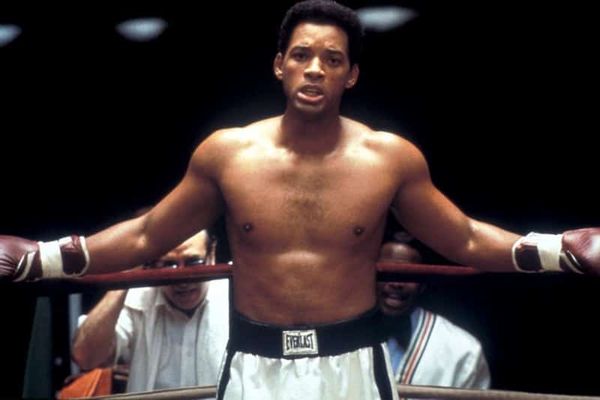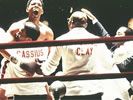Eye For Film >> Movies >> Ali (2000) Film Review
Ali
Reviewed by: Angus Wolfe Murray

Biopics of incredibly famous living people are doomed from the start. There is always something not quite right, or left out, or whitewashed. The story of how Cassius Clay became Muhammad Ali and created his own myth is no exception.
At first sight, the Man In Black is completely wrong for the role. He's too thin, too tall, too Will. By a consistent and focused effort, he wins you over. It is a sensitive, intelligent and captivating performance.

Michael Mann could never be called a journeyman director, someone who fills in when a more creative spirit walks off the set. He is a true filmmaker, in the sense that he thinks visually. For example, he made The Insider, based on a true life corporate scandal, exciting to watch. Here, he does the same. Despite its length, the movie is never boring.
Aspects of Ali are hinted at, rather than explored. There is anger between father and son about his religious conversion and change of name. Malcolm X, who became his friend, is dropped because Elijah Muhammad, the sinister leader of The Nation of Islam, feels threatened by him. Lovers come and go, often as far as the altar, but there is little indication of an addictive womaniser. Angelo Dundee, his trainer whose influence was so important, is played by a very Jewish looking Ron Silver and restricted to the ring side.
The period of Ali's rise from The Louisville Lip to The Rumble In The Jungle was highly political. The Vietnam war raged, causing deeper questions of failure and moral inadequacy throughout the land. Black activists, such as the Panthers, were recruiting in the ghettos. Fascist law enforcers responded violently. There were riots and unlawful killings. Race hatred was aflame, fanned by the rhetoric of confrontation. The Kennedy brothers, Malcolm X and Martin Luther King were assassinated. America was on the brink of civil strife. Those in power felt the fear and abandoned restraint. For a moment, the ideals of peace, freedom and equality were locked into J Edgar Hoover's vault and forgotten. It was ugly. It was scary. African Americans discovered their roots and cried, "No more!"
Meanwhile, Sonny Liston, the heavyweight champion of the world, had been beaten by a kid from the South who talked the leg off a donkey. And then beaten again. Already, Ali's camp was filling with dubious individuals, who benefited from his generosity. He refused the draft. "I know where Vietnam is," he told them. "It's on TV." He had no argument with the Vietcong. "They never called me nigger."
The film does not show how devastating this act of defiance would be to his career, or how out of practice he was when it came to his 1974 comeback against George Foreman in Zaire. The actor who plays Foreman looks older than Ali, when, in fact, he was almost 10 years younger, with a reputation that preceded Mike Tyson's, as that of a vicious opponent, who had never been defeated. Without this knowledge, the way Ali psyches him and fights him appears incomprehensible.
Will Smith handles Ali in the ring as well as he does outside. The emphasis on butterfly feet may be overdone, but he can weave like a willow and bob like a sleigh. Always you know that here is an actor who understands his responsibility to "the greatest boxer the world has ever known" and in no way allows it to intimidate him. De Niro may have set the standard for fight films with Raging Bull, but Smith widens the scope. This icon is flawed.
Reviewed on: 20 Feb 2002



















